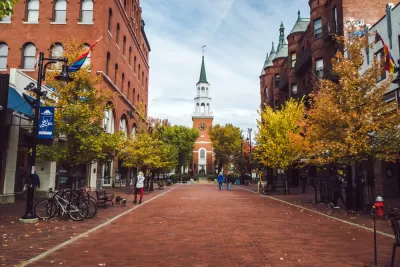A proposal to eliminate parking minimums in the entire city would also expand Burlington’s Transportation Demand Management program.

A proposed ordinance in Burlington, Vermont would eliminate that city’s minimum parking requirements in favor of a more market-oriented approach that would allow developers to build parking if and when the demand for it exists, reports Lilly St. Angelo for the Burlington Free Press. While some city councilmembers support the ordinance, saying it could boost housing construction and limit driving, others express the usual concerns about straining available street parking.
Along with removing parking minimums in certain parts of the city two years ago, Burlington also created parking maximums—an unusually bold move that some developers disagree with. As we recently covered in a prior story, some lenders impose their own parking requirements on developers seeking to secure a building loan, sometimes putting themselves at odds with cities and states working to reduce or eliminate parking requirements.
“Besides taking away minimums, passing the ordinance would expand the city's Transportation Demand Management Program to the whole city instead of just the densest parts.” This program currently requires developers of projects with more than 10 units or 15,000 square feet in a downtown zoning district to follow a set of requirements that include “educating tenants on public transit and car share opportunities, providing free car-share memberships for two years and transit passes for one year to tenants, and doing an annual parking utilization study that is reported to the city. Developers also must unbundle the price of parking from rent.”
FULL STORY: Burlington may eliminate parking minimums for builders city-wide. Here are the possible effects.

Planetizen Federal Action Tracker
A weekly monitor of how Trump’s orders and actions are impacting planners and planning in America.

Chicago’s Ghost Rails
Just beneath the surface of the modern city lie the remnants of its expansive early 20th-century streetcar system.

San Antonio and Austin are Fusing Into one Massive Megaregion
The region spanning the two central Texas cities is growing fast, posing challenges for local infrastructure and water supplies.

Since Zion's Shuttles Went Electric “The Smog is Gone”
Visitors to Zion National Park can enjoy the canyon via the nation’s first fully electric park shuttle system.

Trump Distributing DOT Safety Funds at 1/10 Rate of Biden
Funds for Safe Streets and other transportation safety and equity programs are being held up by administrative reviews and conflicts with the Trump administration’s priorities.

German Cities Subsidize Taxis for Women Amid Wave of Violence
Free or low-cost taxi rides can help women navigate cities more safely, but critics say the programs don't address the root causes of violence against women.
Urban Design for Planners 1: Software Tools
This six-course series explores essential urban design concepts using open source software and equips planners with the tools they need to participate fully in the urban design process.
Planning for Universal Design
Learn the tools for implementing Universal Design in planning regulations.
planning NEXT
Appalachian Highlands Housing Partners
Mpact (founded as Rail~Volution)
City of Camden Redevelopment Agency
City of Astoria
City of Portland
City of Laramie





























